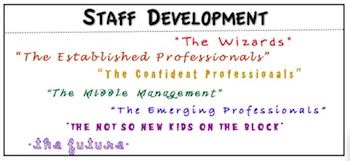-
If you are citizen of an European Union member nation, you may not use this service unless you are at least 16 years old.
-
You already know Dokkio is an AI-powered assistant to organize & manage your digital files & messages. Very soon, Dokkio will support Outlook as well as One Drive. Check it out today!
| |
Developmental Theory and Practice
Page history
last edited
by Ariane Hoy 12 years, 11 months ago

|
Staff Development Resources:
Developmental Theory
and Practice
|
Members of the Bonner Network's Staff Development initiative working group will be helping to develop resources to share with colleagues throughout the network. Below are a few good articles to get us started. Many, many thanks to Jana Schroeder, Coordinator of the Bonner Scholar Program at Earlham College (schroja@earlham.edu) who is currently studying this area (also for graduate work) and developed this bibliography. If you have additional suggested readings, educational opportunities, or other resources (especially new ones), please email them to Ariane Hoy (ahoy@bonner.org) and Jana Schroeder (schroja@earlham.edu).
Recommended Bibliography:
Also available here as a printable handout: Developmental Theory and Practice Reading List for Bonner Wiki.pdf
- Abes, E. S., & Jones, S. R. (2004). Meaning-making capacity and the dynamics of lesbian college students' multiple dimensions of identity. Journal of College Student Development, 45(6), 612-632.
- Ash, S.L., Clayton, P.H., and Moses, M.G. (2008) Learning Through Critical Reflection: A Student Tutorial. Center for Excellence in Curricular Engagement. NC State University.
- Anzaldúa, G. (2002). Now let us shift. In A. Keating & G. Anzaldua (Eds.), This bridge we call home: Radical visions for transformation (pp. 540-578). New York: Routledge.
- Baxter Magolda, M. B. (1992). Knowing and reasoning in college: Gender-related patterns in students’ intellectual development. San Francisco, CA: Jossey-Bass.
- Baxter Magolda, M. B. (1999). Creating contexts for learning and self-authorship: constructive developmental pedagogy. Nashville, TN: Vanderbilt University Press.
- Baxter Magolda, M. B. (2000). Interpersonal maturity: Integrating agency and communion. Journal of College Student Development, 41, 141-156.
- Baxter Magolda, M. B. (2001). Making their own way: Narratives for transforming higher education to promote self-development. Sterling, Va.: Stylus.
- Baxter Magolda, M. B. (2004). Learning Partnerships Model: A framework for promoting self-authorship. In M. B. Baxter Magolda & P. M. King (Eds.), Learning partnerships: Theory and models of practice to educate for self-authorship (pp. 37-62). Sterling, VA: Stylus.
- Baxter Magolda, M. B. (2006). Intellectual Development in the College Years. Change, 38(3), 50-54.
- Baxter Magolda, M. B. (2009). Authoring your life: Developing an internal voice to navigate life’s challenges. Sterling, VA: Stylus.
- Boes, L. M., Baxter Magolda, M. B., & Buckley J. (2009). Foundational assumptions & constructive developmental theory: Self-authorship narratives. In M. B. Baxter Magolda, E. Creamer, & P. Meszaros (Eds.), Development and assessment of self-authorship: Exploring the concept across cultures. Sterling, VA: Stylus.
- Kuh, G. D. (1991). Involving colleges: Successful approaches to fostering student learning and development outside the classroom. San Francisco: Jossey-Bass Publishers.
- Parks, S. D. (2000). Big questions, worthy dreams: mentoring young adults in their search for meaning, purpose, and faith. San Francisco: Jossey-Bass.
- Pizzolato, J. E. (2003). Developing self-authorship: Exploring the experiences of high-risk college students. Journal of College Student Development, 44(6), 797-812.
- Taylor, K. B. (2008). Mapping the intricacies of young adults' developmental journey from socially prescribed to internally defined identities, relationships, and beliefs. Journal of College Student Development, 49(3), 215-234.
- Tobolowsky, B. (2008). Sophomores in transition: The forgotten year. New Directions for Higher Education, (144), 59-67.
- Torres, V., & Baxter Magolda, M. B. (2004). Reconstructing Latino identity: The influence of cognitive development on the ethnic identity process of Latino students. Journal of College Student Development, 45(3), 333-347.
Other Resources (a bit more dated):
This additional summary of student development theories (found from the California Alumni Association Student Services Department) includes a concise review of theories (with special attention to issues of ethnicity, gender, and majority/minority concerns) including:
- Abraham Maslow (Hierarchy of Needs)
- Arthur Chickering (Education and Identity - Seven Vectors)
- Lawrence Kohlberg (Moral Development and Cognition)
- William Perry (Intellectual and Ethical Development)
- William E. Cross Jr. (Nigrescence)
- Corinne Maekawa Kodana, Marylu K. McEwen, Christopher T. H. Liang, Sunny Lee (An Asian American Perspective on Psychosocial Student Development Theory)
- Carol Gilligan (Care Voice vs. Justice Voice)
- Vivienne Cass (Homosexuality Identity Formation)
Note that these authors are not as current as the list above but are also considered important in the field.
View the page here: Synopsis of Student Development Theories
Developmental theories are often helpful in grounding program and curriculum design. The Bonner Program's four-year developmental model is well-supported and connected with various developmental theories.
See this chart, which represents the four-year "journey through service" that program aspire to create:
Since its conception, the program has aimed to operate on a developmental model that is grounded in knowing and tapping into the experiences, talents and developmental needs of students during their undergraduate years of college. See this essay (first created in 1996) that outlined the model:
This handout is a good illustration of how to think about the needs and growth of a college student through service and service-learning experiences.
Developmental Theory and Practice
|
|
Tip: To turn text into a link, highlight the text, then click on a page or file from the list above.
|
|
|
|
|
Comments (0)
You don't have permission to comment on this page.